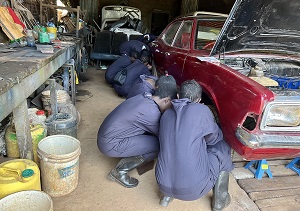UNODC Eastern Africa News and Stories
You are here: Home / News
Counter-extremism project empowers vulnerable young Kenyans
 14 November 2022, Nairobi - In central Kenya’s Kirinyaga County, 19-year-old Anne (not her real name) is among 15 ex-rehabilitation children and youths who recently received toolkits to complement their vocational training and boost their employment prospects.
14 November 2022, Nairobi - In central Kenya’s Kirinyaga County, 19-year-old Anne (not her real name) is among 15 ex-rehabilitation children and youths who recently received toolkits to complement their vocational training and boost their employment prospects.
These included five toolkits for dressmaking and tailoring; two for hairdressing; two for electrical and wiring; two for masonry; and four for automotive work.
The “empowerment tools” were provided through a Preventing and Countering Violent Extremism project implemented by UNODC in partnership with Kenya’s Directorate of Children Services (DCS) and Global Affairs Canada. The three-year project seeks to reduce recidivism and prevent and counter violent extremism among child and youth offenders in Kenya.
Having come into conflict with the law, Anne was sent to Kirigiti Girls’ Rehabilitation School in 2018. She is now a student at Mutuorota Polytechnic and in August was the proud recipient of hairdressing equipment. She is also undertaking tailoring and crop cultivation courses.
“I was sent to Kirigiti due to truancy. Consequently, I received counselling and mentorship which moulded my behaviour for the better,” Anne explained. “I’m determined to make a fresh start and have been able to acquire dressmaking and hairdressing skills which will enable me to engage in self-employment after I complete my training in February 2023. I have also learnt how to cultivate maize,” she said.
Building new lives
One hundred children and youths who have, or are, spending time in six rehabilitation schools across Kenya are being supported by DCS and UNODC through the project, along with direct support to the various statutory institutions managed by DCS, including equipment.
Michael,16, has been a student at the Kabete Boys’ Rehabilitation School, Nairobi County, since August 2021. The school received working boards and wiring cables which have facilitated learning about electrical work.
“I’ve experienced a major transformation in my life. I came into conflict with the law due to petty theft and fraud as well as truancy in my native Machakos County,” Michael said. “At Rehabilitation School I’ve received counselling and mentorship and acquired skills in electrical wiring and in cultivation of vegetables such as spinach, tomatoes, and kale. I’ve also nurtured supportive friendships with my instructors and fellow students. I look forward to earning a livelihood when I complete my Electrical Wireman Grade III training in early 2023,” he said.
The mechanical workshop at Kabete Boys’ Rehabilitation School is also being used to deliver vocational training for the Dagoretti and Kirigiti girls’ rehabilitation schools on Mondays and Fridays – among them 16-year-old Janet from Narok County. Prior to joining the Kirigiti school, she had been skipping school and dabbling with drugs.
“I am excited to learn new skills in what has traditionally been a boys’ domain. I now understand how a car’s ignition system works and know how to use tools such as ratchet socket handles and wheel spanners, as well as a diagnostics machine,” Janet said.
Janet was also able to continue her education and sat for the Kenya Certificate of Primary Education examination in March 2022.
 UNODC follows a rehabilitative pathway to prevent radicalization and effectively manage violent extremism in correctional facilities. This approach is based on respectful treatment, human rights, opportunities to learn new educational and vocational skills, harnessing family, and establishing post-release supports for ex-offenders. Such supports include empowerment programmes, psychosocial support and community partnerships.
UNODC follows a rehabilitative pathway to prevent radicalization and effectively manage violent extremism in correctional facilities. This approach is based on respectful treatment, human rights, opportunities to learn new educational and vocational skills, harnessing family, and establishing post-release supports for ex-offenders. Such supports include empowerment programmes, psychosocial support and community partnerships.
“This project is deploying vocational interventions that cater for the needs of offenders while nurturing their aspirations. It is geared at minimizing an offender’s vulnerability and promoting self-sufficiency to ensure successful reintegration into society. Educational and vocational opportunities curtail conditions conducive to crime and violence, thus mitigating serious risks to society,” UNODC’s Eastern Africa Regional Head of the Crime Prevention and Criminal Justice pillar, Ms Charity Kagwi-Ndungu, said.
“Through consistent counselling support there has been a marked behavioural change in this vulnerable group of children. The psychosocial support has contributed to them playing constructive and productive roles in their communities and learning institutions,” Ms Kagwi-Ndungu said.
[The names of the children mentioned in this report have been changed to maintain confidentiality].
More information
- Preventing Violent Extremism in Kenya’s Children’s Statutory Institutions
- Email: unodc-easternafrica@un.org
- As a custodian of Sustainable Development Goal 16, UNODC supports Member States in the establishment of effective, fair and humane criminal justice systems. It provides normative, analytical, and operational assistance to strengthen criminal justice institutions to tackle crime, corruption, and terrorism.